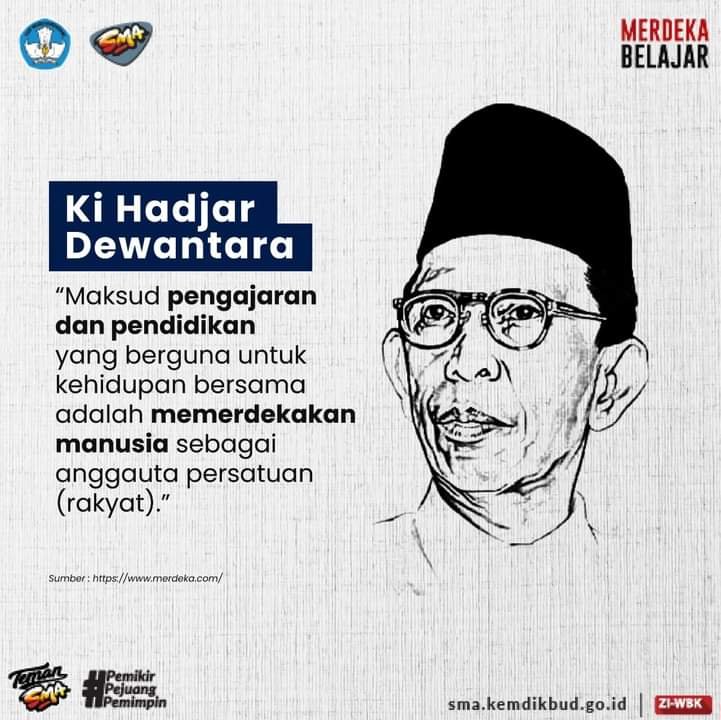
Education, according to Ki Hajar Dewantara, lies at the heart of a nation’s progress. He believed that true learning goes beyond textbooks; it nurtures character and cultivates critical thinking. Dewantara championed the idea that education should adapt to the needs of the child, fostering an environment that encourages growth and creativity.
His philosophy emphasizes the role of teachers and the community in shaping the future. Embracing these principles can lead to a holistic educational experience that prepares individuals for the complexities of life. In this exploration, we will delve deeper into the insights of Ki Hajar Dewantara and their relevance today.
“`html
Menunjukkan ‘Menurut Ki Hajar Dewantara’
Ki Hajar Dewantara is a prominent figure in Indonesian education, renowned for his revolutionary thoughts and principles. Born on May 2, 1889, he became a pioneer in promoting education that was not only accessible but also relevant to the needs of the Indonesian people. His ideas, particularly about educational philosophy, social justice, and national identity, form the backbone of modern Indonesian education. This article explores Ki Hajar Dewantara’s philosophy and its implications for education today.
Understanding the Philosophy of Ki Hajar Dewantara
Ki Hajar Dewantara believed that education was not merely about transferring knowledge but rather about nurturing individuals to become beneficial to society. His famous saying, “Ing ngarso sung tulodo, ing madyo mangun karso, tut wuri handayani,” which translates to “In front, the leader sets an example; in the middle, he builds spirit; at the back, he encourages,” summarizes his educational approach.
The Core Principles of Ki Hajar Dewantara’s Educational Philosophy
- Educational Inclusivity: Ki Hajar Dewantara emphasized education for everyone, regardless of their social or economic status. He believed that education should be accessible to all children, as it plays a crucial role in empowering individuals and communities.
- Character Building: According to Dewantara, education should focus on developing strong moral character. He believed that a well-rounded individual should possess not only knowledge but also good character traits.
- National Identity: He advocated for an education system that reflects and respects the culture and heritage of Indonesia. Dewantara understood the importance of instilling national pride in students.
The Impact of Ki Hajar Dewantara on Indonesian Education
Ki Hajar Dewantara’s influence on Indonesian education is profound and far-reaching. His advocacy for an education system that caters to the needs of the Indonesian population laid the groundwork for significant educational reforms.
Establishment of Taman Siswa
One of Dewantara’s most significant contributions to education was the establishment of Taman Siswa in 1922, which translates to “Garden of Students.” This institution aimed to provide an education rooted in Indonesian culture, adapting to the local context and needs.
- Curriculum Diversity: Taman Siswa offered a diverse curriculum that integrated arts, crafts, and physical education alongside traditional academic subjects.
- Fostering Creativity: The schools under Taman Siswa encouraged students to think critically and creatively, allowing them to explore their talents and interests.
- Community Involvement: Ki Hajar Dewantara involved parents and local communities in the education process, emphasizing the importance of collective responsibility in nurturing children.
Ki Hajar Dewantara’s Beliefs About Learning
Dewantara had a unique perspective on learning, which differs from traditional approaches that focus solely on rote memorization and standardized testing. He believed in a more holistic approach that encourages active participation.
Learning through Experience
One of the key elements of Dewantara’s philosophy is experiential learning. He argued that students learn best when they can connect theoretical knowledge with real-world experiences.
- Hands-On Learning: Dewantara promoted learning through practical engagement, where students could apply their knowledge in meaningful ways.
- Encouraging Curiosity: He believed in nurturing a sense of curiosity among students, motivating them to explore topics and ask questions actively.
- Self-Directed Learning: Dewantara encouraged students to take charge of their own learning paths, fostering independence and critical thinking.
Social Justice and Education
Ki Hajar Dewantara was not just an educator but also a social reformer who recognized the connection between education and social justice. He believed that education should serve as a tool for equality and liberation.
Empowering Marginalized Communities
Dewantara’s educational policies aimed at empowering marginalized communities, particularly during the colonial era when access to quality education was limited for many Indonesians. His approach to education aimed to break the cycle of poverty and inequality.
- Advocacy for Rights: He advocated for the right to education for all, regardless of background, gender, or socio-economic status.
- Community Schools: Ki Hajar Dewantara promoted the establishment of community schools that served underprivileged areas, making education accessible to all.
- Inclusivity in Education: His emphasis on inclusivity in education ensured that children from various backgrounds could learn together, fostering understanding and tolerance.
Ki Hajar Dewantara’s Legacy in Modern Education
Today, Ki Hajar Dewantara’s ideology continues to impact educational practices in Indonesia and beyond. His principles are woven into the fabric of modern education in various ways.
Reflection in National Education Policies
Ki Hajar Dewantara’s vision of education can be seen in Indonesia’s national education policies, which emphasize character education, local content, and inclusive practices.
- Character Education: Modern policies aim to cultivate moral values alongside academic success, reflecting Dewantara’s focus on character building.
- Localized Curriculum: Schools increasingly incorporate local history and culture into their curriculum, aligning with Dewantara’s belief in promoting national identity.
- Inclusive Practices: Educational reforms continue to emphasize creating an inclusive environment where all students feel valued and respected.
Influence on Educators Today
Educators today draw inspiration from Dewantara’s philosophy as they strive to create engaging and relevant learning experiences for their students.
- Student-Centered Learning: Teachers are encouraged to focus on the needs and interests of their students, fostering a more engaging learning environment.
- Collaborative Learning: Group projects and peer learning reflect Dewantara’s belief in the importance of community in education.
- Active Engagement: Classrooms now often feature hands-on activities and interactive lessons that promote active learning.
Challenges in Implementing Dewantara’s Philosophy
Despite its benefits, implementing Ki Hajar Dewantara’s educational philosophy presents several challenges. Understanding these challenges is crucial for educators and policymakers.
Resistance to Change
Many traditional educational systems are slow to adapt to new ideas. Teachers and administrators may resist changing established practices due to fear of the unknown or lack of training.
- Skepticism from Educators: Some teachers may feel insecure about using new teaching methods, preferring to stick with familiar practices.
- Inadequate Professional Development: Often, educators do not receive the necessary training to effectively implement Dewantara’s ideas in the classroom.
- Lack of Resources: Schools may face financial or material limitations that hinder the adoption of innovative teaching strategies.
Balancing Tradition and Innovation
Finding the right balance between traditional educational practices and modern approaches can be challenging.
- Preserving Cultural Heritage: While promoting innovation, educators must also respect and preserve cultural practices in education.
- National vs. Local Needs: Striking a balance between national curriculum requirements and local adaptations poses a challenge for many educators.
- Varied Learner Needs: The diverse backgrounds of students require personalized approaches, which can be difficult to implement universally.
Future Directions Inspired by Ki Hajar Dewantara
Moving forward, educators and policymakers can build on Ki Hajar Dewantara’s legacy to create an education system that meets the needs of all students.
Incorporating Technology in Education
As technology advances, integrating digital tools into the classroom can enhance learning experiences.
- Access to Online Resources: Providing students with access to a wealth of information can encourage independent learning.
- Interactive Learning Platforms: Utilizing technology can facilitate interactive and engaging learning environments.
- Collaboration Across Distances: Technology allows students to connect with peers and educators globally, expanding their horizons.
Continued Advocacy for Educational Equity
The fight for educational equity remains crucial. Advocates can continue to push for changes that ensure all students have access to quality education.
- Policy Changes: Advocates can work towards policies that promote inclusivity and equal opportunities in education.
- Community Engagement: Encouraging community involvement in schools can support marginalized communities and improve educational outcomes.
- Support for Educators: Providing professional development and resources to teachers can empower them to implement Dewantara’s philosophy effectively.
Ki Hajar Dewantara’s educational philosophy continues to resonate today, inspiring educators and shaping the future of education in Indonesia and beyond. His commitment to inclusive, character-driven, and contextually relevant education serves as a guiding light for those striving
Ki Hadjar Dewantara, Bapak Pendidikan yang Bersuara Lantang
Frequently Asked Questions
“`html
What educational philosophy did Ki Hajar Dewantara emphasize?
Ki Hajar Dewantara highlighted an educational philosophy that prioritized the development of character and personality alongside intellectual growth. He believed that education should nurture an individual’s moral values and cultural identity. Dewantara advocated for a holistic approach, integrating physical, emotional, and spiritual development within the learning process.
How did Ki Hajar Dewantara contribute to Indonesian education?
Ki Hajar Dewantara made significant contributions to Indonesian education by establishing the Taman Siswa school system in 1922. This initiative focused on providing accessible education to all, particularly for the indigenous population. He promoted an education system that respected local culture and values while incorporating modern teaching techniques, laying the foundation for national education in Indonesia.
What were Ki Hajar Dewantara’s views on the role of teachers?
Ki Hajar Dewantara regarded teachers as vital figures in the educational process. He viewed teachers not just as instructors but as mentors who guide students in their personal and academic development. Dewantara emphasized that teachers should embody the values they teach, fostering a supportive environment that encourages creativity and critical thinking among students.
How did Ki Hajar Dewantara view the relationship between education and culture?
Ki Hajar Dewantara believed that education should be deeply intertwined with culture. He argued that education must reflect and promote local traditions, languages, and customs to cultivate a strong sense of identity among students. By integrating cultural elements into the educational curriculum, Dewantara aimed to foster pride in one’s heritage while preparing students for a modern society.
What is the significance of Ki Hajar Dewantara’s motto “Ing ngarso sung tulada, ing madya mangun karsa, tut wuri handayani”?
Ki Hajar Dewantara’s motto translates to “In the front, give an example; in the middle, build enthusiasm; at the back, provide support.” This phrase encapsulates his educational philosophy by highlighting the roles of guidance, inspiration, and support in teaching. It emphasizes that educators should lead by example, motivate their students, and be available to assist them in their learning journey.
“`
Final Thoughts
Menjadi pendidik yang baik membutuhkan pemahaman yang mendalam tentang serta penghargaan terhadap karakter dan potensi siswa. Menurut Ki Hajar Dewantara, pendidikan harus menyesuaikan diri dengan keadaan dan kebutuhan anak-anak. Ia menekankan pentingnya pendekatan yang humanis dalam proses belajar mengajar.
Pendidikan bertujuan untuk membentuk pribadi yang mandiri dan bertanggung jawab. Dengan menerapkan prinsip-prinsip Ki Hajar Dewantara, kita bisa menciptakan lingkungan belajar yang kondusif bagi pertumbuhan siswa. Idealnya, pendidikan harus mengembangkan kemampuan dan bakat setiap individu secara optimal, sesuai dengan pandangan yang dianut oleh Ki Hajar Dewantara.




